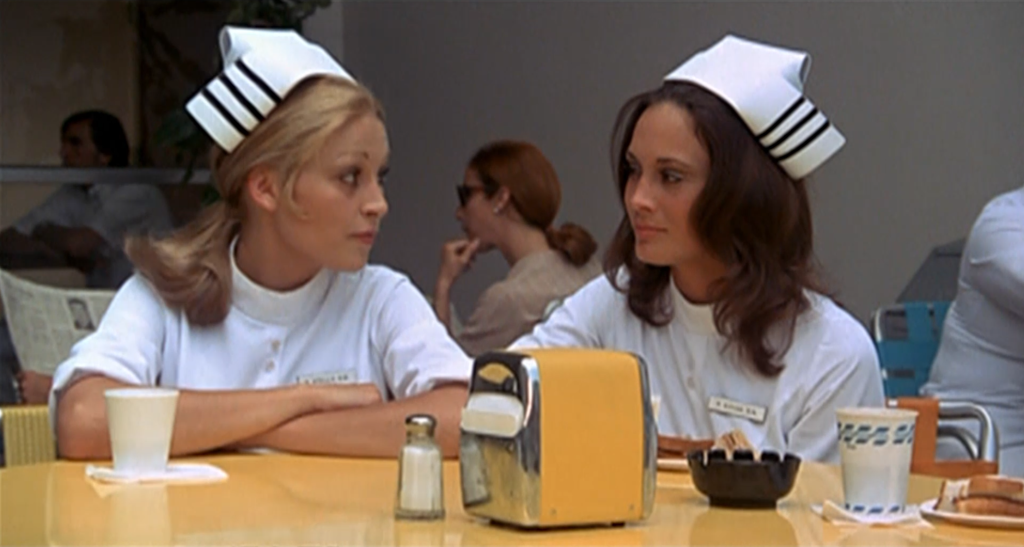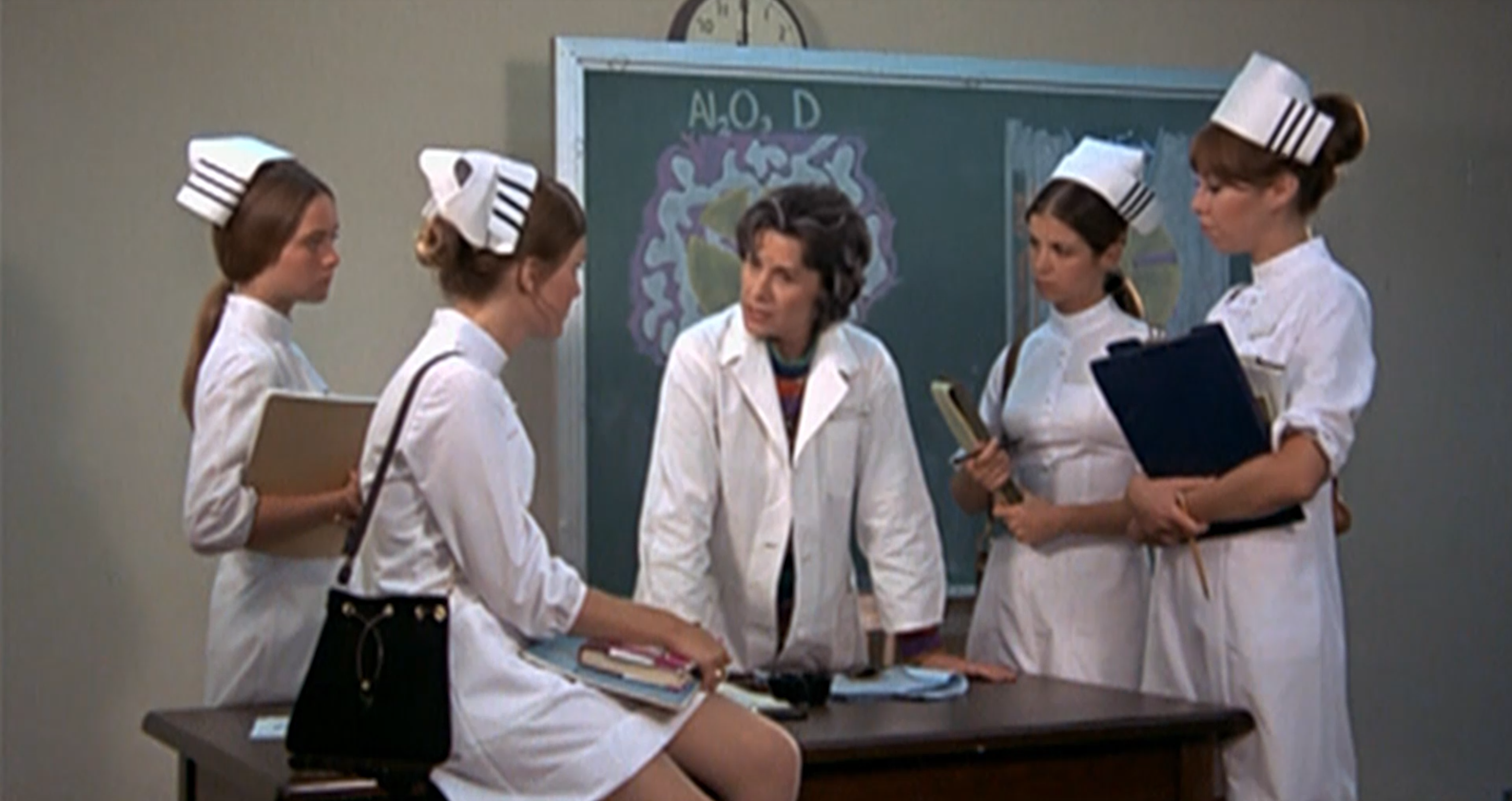The Student Nurses (1970) is screening at Watershed, Bristol, on Thurs 25 July, 8.30 pm, as part of Cinema Rediscovered 2024, who commissioned this essay by Anahit Behrooz, which is crossposted with kind permission from their new online home on Letterboxd.

Exploitation Politics: Revisiting Stephanie Rothman’s The Student Nurses
By Anahit Behrooz
I am writing this on the day of the UK general election, a day which will – after 14 long years – decide the moral fate of the country, except it won’t, not really. The same things hang in the balance, the same things that always have – the violence of the state, the (dis)empowerment of the working class, the bodily autonomy of the marginalised, the erosion of welfare provisions – and it is difficult to believe they won’t still be hanging in the balance tomorrow. These things have always been hanging, it seems; strung up like a fragile mobile, fine wire trembling at the slightest breeze.
It is strange coming to Stephanie Rothman’s The Student Nurses in this week of all weeks, a film that was written in equally precarious, if not explicitly apocalyptic, times. There is the superficial alignment, of course, at a time when the NHS is on its knees – a film about young people in healthcare navigating an increasingly rigid and unforgiving system, a film which calls attention to the contradictions and cruelties of care as labour when the system itself does not care – but there is also the film’s own coy and slant contradictions, the impossibility of its existence at all. An exploitation film that both leans into the supposed fact of young female nurses as inherently erotic and into a slew of leftist themes – among them reproductive rights, police violence, and anti-war sentiment – The Student Nurses, much like its eponymous four characters, is doing its best within a system that seeks its destruction.
Rothman was, of course, deeply aware of the paradox of her own filmmaking. Exploitation cinema was on the up and up in the late 60s and early 70s and Rothman was employed, itself a deeply unusual state of affairs for a female filmmaker at the time, at king-of-the-B-movie Roger Corman’s New World Pictures. Corman himself had numerous kitsch and grisly adaptation of Edgar Allan Poe under his belt, as well as the OG Little Shop of Horrors, and the move towards the sexy, unscrupulous camp of the exploitation film suited him and his production company well. For Rothman, whose filmmaking was always undergirded by a feminist ethics, the expected titillation of the exploitation film was a difficult pill to swallow, a frustrating means to a desired end. “When the scripts were written it was built in,” Rothman said of the genre’s gratuitous nudity and violence in a piece with Interview Magazine. “Was I thrilled with doing that? Usually not. But that’s what was required, so that’s what I did…What I needed to do was try to refine that and give it some meaning beyond the violence itself, or beyond the nudity itself.”

This gritted teeth subversion stitches bright like a thread (surgical or otherwise) through the film and the four, at times goofy, at times strangely empathetic leads, whose narratives demand of them a political education as much as they do the requisite toplessness of an exploitation film. Much has been made of Barbara Leigh’s Priscilla and her abortion storyline, three years before Roe v Wade was passed and the dangers that Priscilla is subjected to – refusal by her workplace to sanction a termination, an at-home procedure with a sympathetic doctor and no other medical infrastructure – rendered null for many. That Rothman follows the fleshy sexuality of the exploitation film to its natural conclusion feels miraculous; she offers the fantasy and doesn’t let go, revealing its unerotic and uncinematic next step, at a time when the camera would often fade to end.
But I am struck, today of all days, by another of the nurses: the naïve yet determined Lynn and her entanglement with a Chicano resistance group, and the ways her pulpy journey from ingenue to fuck-the-police fighter interrogate much broader ideas about the relationship between the individual and the state. “I wish I could do something,” Lynn says about the neglect she sees all around her; it is the beginning of her understanding her own power as an individual and worker, rather than a cog in the machine. Through the course of the film, Lynn moves away from institutions – the hospitals, the state – and towards the collectivity and movement of the people, finding a way to “make a difference” (that ancient healthcare motto) there. That it comes with a shoot-out and lots of derisive mentioning of “pigs” feels lurid and exciting, but the heart of her journey feels optimistically grounded. There is a meaning, as Rothman hoped there would be, behind the violence.
It is time to vote, and I cannot stop thinking about things being smuggled into other things, policies into parties, politics into genre. Rothman’s The Student Nurses is a Trojan horse of a film; you don’t have to forgive it its exploitative veneer to acknowledge nevertheless what is being determinedly hidden underneath. “I wanted to have a conversation with a wider audience who might not encounter these ideas at all,” Rothman says of the film’s political bent, “or might encounter them in a very narrow and stereotypical form. I wanted to open their minds as best as I could.” The result is leftist cinema at its most subversive and agitprop: a radicalism for the masses.
*
Anahit Behrooz is a writer, editor and journalist based in Edinburgh covering film, literature, and cultural politics. The Student Nurses is presented for Cinema Rediscovered as part of Other Ways of Seeing with support from BFI Awarding Funds from the National Lottery. It screens on a new 35mm print, courtesy of MoMA, Cinema Conservancy & the Women’s Film Preservation Fund, programmed by Selina Robertson and Isabel Moir. They have written about their experience with programming Stephanie Rothman for WFTHN.
